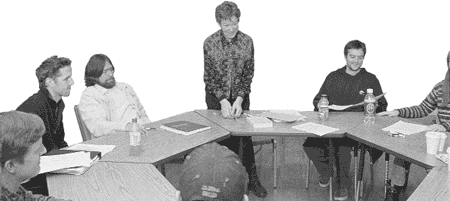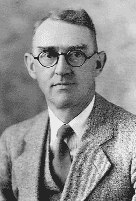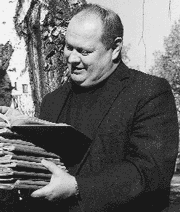Writers at WorkUM's Creative Writing Program Hits Its Strideby Constance Poten
"With its cynical disregard of relative values, the imagination is one hell of a durable democracy..."
In March 1997, when U.S. News & World Report reported that UM's Creative Writing Program ranked in the top ten of its kind, a discernible glow emanated from the west end of the Liberal Arts Building, burning right through the ice-toothed, gray bottom of winter. The news was pure delight and no surprise to the program's director, Kate Gadbow, and former Director Lois Welch, now chair of the English department. It was proof, in black and white, that the program was strong enough to be nationally recognized, joining the exalted ranks of the University of Iowa, Johns Hopkins University and Columbia University. The achievement is impressive considering the recent proliferation of such programs: more than 200 universities offer graduate degrees in creative writing today, up from forty-four in 1970. In an era with a surging emphasis on career, money and the trappings of luxury it's interesting to note that a creative writing degree is not required for any job on the planet. "The students don't come into the program for the degree," Gadbow says with a knowing smile. "It's the experience of having a place to concentrate. It's a reaction to the culture. They want something challenging. They want to be able to think and write in a community of like-minded peers who will be their readers." Students in the program average in their late twenties and hail from all corners of the country. Most have held other jobs, often as ski instructors, lawyers, outdoor recreation guides, teachers and software industry workers. At least half of them receive financial assistance: tuition waived and an $8,000 stipend for teaching one undergraduate comprehensive writing class. They choose Montana over other schools for its emphasis on quality writing rather than market pushing; its tradition of independent, well-published professors; its egalitarian, supportive reputation; and its location away from the crowd. "We're going to hell a little bit slower here," poet Richard Hugo once said.
An Age of Upheaval
In 1919 scholar H. G. Merriam returned to the West from Oxford's first class of Rhodes Scholars. Hired by the University, he launched the undergraduate creative writing program. It was an age of upheaval, which may account for his success in storming the campus with a thought-provoking program. T. S. Eliot would soon write The Wasteland; World War I had torn apart Europe, inciting revolutions from Russia to Mexico. Due west of Missoula, in Spokane, Washington, suffragist May Hutton had declared, "We either evolute or revolute." Her rallying cry carried Merriam's own sentiments. "He believed there was a Western voice in writing," says his granddaughter Ginny Merriam, longtime writer for the Missoulian. "He grew up in Denver and was exposed to it. Harvard offered the only creative writing program in the country then." Merriam gained fame for the UM program and for summer writing conferences--lasting through 1960--that attracted literary greats such as Nelson Algren, Wallace Stegner and Bernard Malamud. Welch, at work on a book about the program, forwards her theory as to what drove Merriam: "My suspicion is that H. G. at Oxford was treated like a rube from a country with no literary tradition. He came back here and said, 'We can do this. Here.'" "Merriam was a strange, tough fellow," recalled poet and critic Leslie Fiedler, who taught English literature at UM from 1941 to 1965. In a 1980 interview with Deirdre McNamer--then feature writer for the Missoulian and now author of three novels and sought-after professor of creative writing at UM-- Fiedler said, "I don't think Merriam ever said to me in his life one word of praise. His specialty was looking disapproving. On the other hand he gave everyone who taught in his department absolute freedom to do anything they wanted to do." Then came Hugo.
The BulldozerIn 1965, brilliant, ambitious chair of the English department, Warren Carrier wanted a higher profile for the writing program. He founded the Master of Fine Arts in Creative Writing degree and hired Richard Hugo, sight unseen, on the basis of his poetry--already nationally recognized. On board came the wildest bunch of renegade writers any one institution has had the luck to land. James Lee Burke, James Crumley, William Kittredge, Earl Ganz and Madeline DeFrees joined Hugo, and batches of talented students started to produce fresh and stimulating work. Graduates included James Welch, Rick DeMarinis and Sandra Alcosser, whose most recent book of poetry, Except by Nature, won the 1997 National Poetry Series Award, the 1998 James Laughlin Award of the Academy of American Poets and the Pacific Northwest Booksellers Poetry Award (see Books for a review). But after giddy expansion, the University suddenly faced retrenchment, a casualty of Montana's boom-bust economy. As suddenly as it was born, the writing program faced the ax. "Academics tended to look down on writers," remembers Ripley Hugo, a poet and teacher who is Hugo's widow. "Dick squelched that." "Yes, he was that important," Lois Welch says. "Hugo was so popular as a reader, traveling the country. We got national recognition. He fought for the program. He was perfect: a big bulldozer defending poetry." "Because of Dick," Ripley Hugo says, "the program became a rare place where people were eager to have each other get published. He instilled the sense that one person's triumph indicates someone else's. This general rejoicing is something you don't find elsewhere." Nominated for the National Book Award and twice for the Pulitzer Prize, Hugo won fellowships to Europe, edited the Yale Younger Poets Series from 1977 to 1982 and cofounded Poetry Northwest. UM's site on the literary map of America grew from a small dot to a large star. The program flourished. From 1986 to 1994 Welch, married to writer James Welch, directed the program with a loving touch, chosen, she says, because "I know so much about the care and feeding of writers."
The Best Place
"It's one of the more competitive programs on campus," says director Gadbow, a writer herself. Ten years ago seventy-seven applicants vied for the thirty spots, but by 1992 applications had risen to 394. Published internationally, the faculty today includes fiction writers Kevin Canty, Debra Earling, McNamer and visiting writer Fred Haefele, who teach alongside award-winning, established poets Patricia Goedicke, Greg Pape and Mark Levine. The faculty members uphold, in Goedicke's words, "the very deep tradition of real generosity, kindness and interest in others that has always existed in this program." Central to this tradition is Kittredge, a major voice of the American West who recently retired from twenty-eight years of teaching to write, play golf and write some more. His accessible honesty infused the program with an easy, straightforward dignity. Immensely popular with his students, Kittredge carried forward the ideals of compassion and challenge instilled by Hugo. Kittredge also brought international attention to the program by teaching writing workshops from coast to coast and giving countless readings throughout the United States and abroad. The value of the program, however, finally depends on the student's experience. "The program was difficult. It was hard," says Beth Brinsfield, who earned a Master of Fine Arts degree at UM and is now working on a novel in Santa Fe. "It was the best place. I have no regrets. I feel like I'm a writer now." Constance Poten contributes frequently to the Montanan and is redefining the concept of dried tomatoes with Connie's Tomato Chips. |


